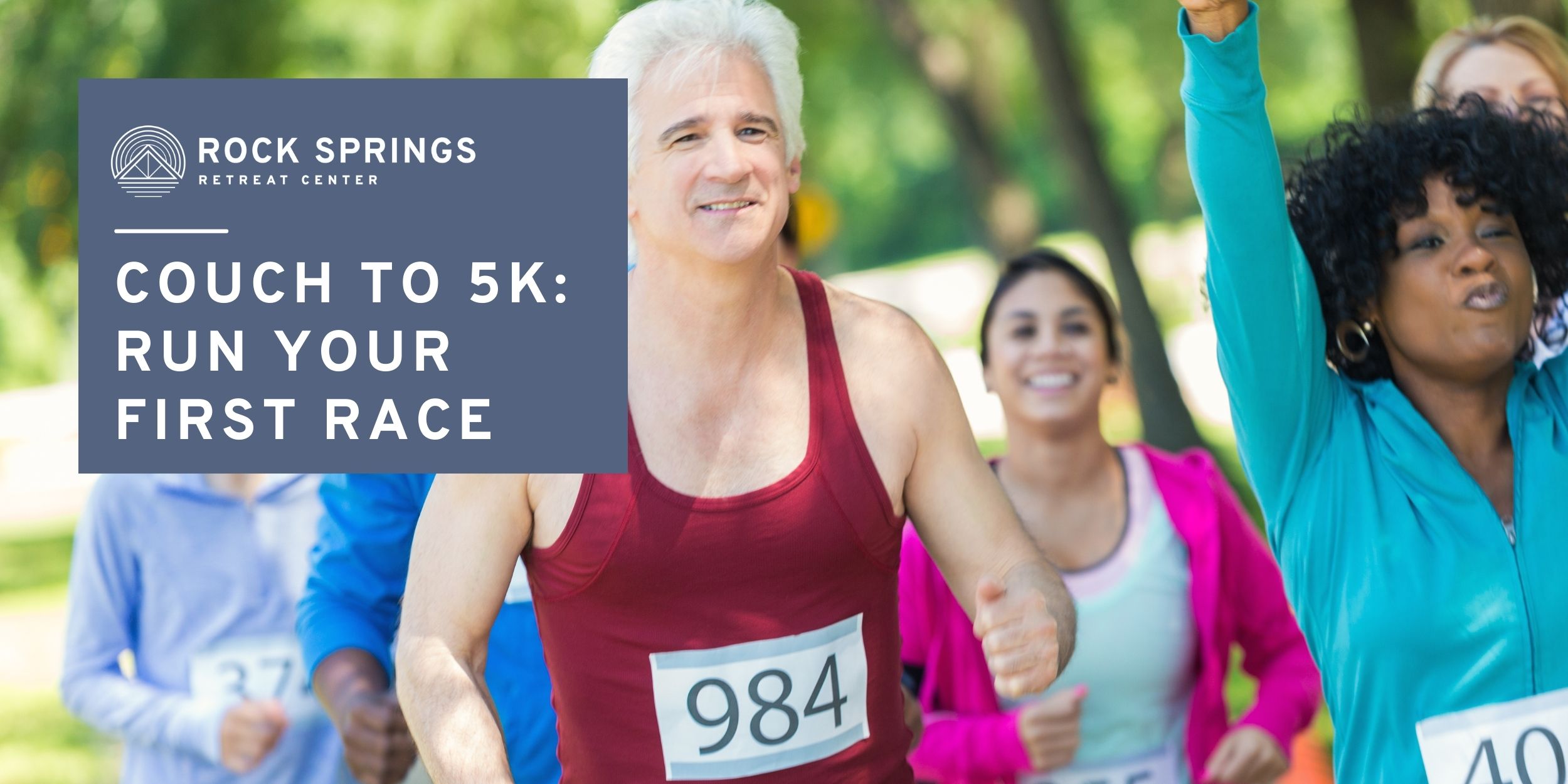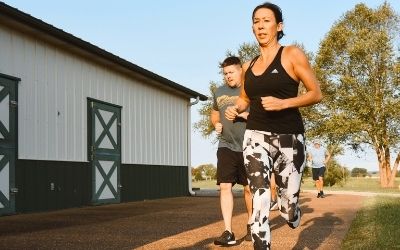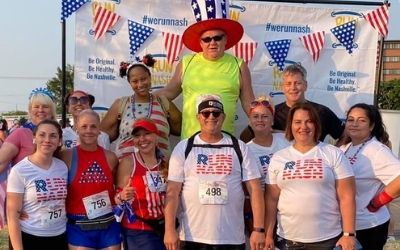
If you’re looking into participating in your first 5k and don’t know where to begin, you’ve come to the right place! The idea of running your very first 5k (3.1 miles), can be both exciting and intimidating at the same time. 5k’s require proper training and preparation that takes time regardless of your experience level. If you are green and this is your first race, fear not! This beginner-friendly guide will walk you through what you need to do to get you from the couch to your first 5k!
Expectations

Let’s start this off by setting expectations. Dedicating a realistic amount of time to train for ANY race is key. You don’t want to push yourself to a point of injury. That’s why with the right plan and rest, you will be set for success. Remember that Rome wasn’t built in a day. Be patient and listen to your body in order to avoid injuries. Just because it’s a 5k doesn’t mean you have to run the entire thing, or even run at all for that matter. There’s no shame in walking the race. In fact, you should be proud that you attended the race and made it to the finish line!
Gear Up

You’ll want to invest in a good pair of running shoes. Don’t gamble with buying your shoes online. We know that it’s tempting because of how convenient it is, but this is a step that’s critical to do in person. Find a local store in your area that specializes in running and walking. The staff there will be able to help you find the best pair of shoes for your needs and will ensure they fit properly. Trust us, your feet will thank you later.
Pro tip: Make sure you wear in your new running shoes before the big race!
Another essential piece of gear that you don’t want to overlook is running shorts (especially for men). Choosing the right material will help keep you cool and prevent chafing. You’ll want to avoid cotton as this material is a recipe for disaster. Instead, look for polyester or spandex. For our male readers, you may want to consider shorts with quality liners. These act as a replacement for underwear and helps prevent chafing as well. As far as length goes, it’s really based on personal preference. Just try to stick to shorts that don’t go below your knees.
Fuel Up

Nutrition is important on a daily basis. It’s even more important if you plan to exhaust your fuels in a way that your body isn’t used to. Proper dietary intake is essential to fuel your body with the necessary nutrition for performance and recovery. While you’re training, macronutrients will be your best friend. Just like you learn during our fitness and weight loss retreats here on the farm, keeping track and ensuring you have a properly balanced macronutrient-rich diet is fundamental in your training efforts. Their macronutrients include carbohydrates, proteins, and fats. Carbs will provide your body with the energy to make it to the finish line, proteins aid in muscle recovery and building, and fats provide a backup source for fuel and help you feel full. Here’s a sample training diet plan from Abbott.
Training Meals and Hydration
The calorie-controlled, macro-balanced recipes from Fit Farm are a great source of options for you during your training.
Breakfast: Eggs, whole wheat toast, half an avocado, and a whole banana
Morning snack: Apple with peanut butter
Lunch: Quinoa bowl with black beans, chicken, assorted vegetables, salsa, and cheese
Pre-run snack: Greek yogurt with berries and low-fat granola
Post-run dinner: Ginger Grilled Salmon, brown rice, broccoli with butter
Bedtime snack: Milk, whole-grain cereal, and berries
Note that this format is for TRAINING. What you consume on race day will be different.
Night Before the Race Meals
It’s true what you hear, eating plenty of carbohydrates the night before a race is a good approach. These meals would include pasta, sandwiches, and rice dishes. Make sure to include protein in the overall meal. But what you may not be aware of, are the things to avoid the night before a race. Steer clear of high-fat and high-fiber meals as these foods are more difficult to digest and may cause cramping. You’ll want to have plenty of fluids to maintain a hydrated status (urine should be clear or faint yellow).
Race Day Meals
It’s very important to time when you consume your meals this day. Your pre-and post-race meals are what will make or break your body. Eating too soon before a race can cause cramping and reversely, eating too soon can cause low energy. Try to aim for your meal about 1-4 hours before the race with the size of your meal varying based on timing before the race. Post-race you’ll want to eat within 30 minutes to replenish your energy and minimize muscle soreness. Don’t forget to stay hydrated throughout the day. That includes pre-, during, and post-race.
Pre-race Meals
Pre-race meals should consist of fast-acting carbs with some proteins and fats. Below are some good light snacks and meals to choose from.
- Bagel with peanut butter and jelly with juice
- Pancakes (or waffles) with syrup and fresh fruit
- Oatmeal with fruit and juice
- Ham or turkey sandwich with a small apple and baked chips
- Fit Farm’s Peanut Butter Balls (recipe here)
Pre-race Hydration
Staying hydrated pre-race is critical to avoid cramping or heat exhaustion. Here are some tips for liquid consumption pre-race:
- 2 cups 2-4 hours before race
- 1 cup – 1 hour before race (if urine is not clear or faint yellow)
- 1 cup – 10-20 min before race
Post-race Meals
Post-race is all about restoring your energy and helping your muscles recover, so you’ll want something that consists of both carbohydrates and protein. Even having some sugar after the race is okay (Yes, you heard correctly. Fit Farm just gave you permission for sugar – you worked hard, you earned it!).
- Protein shake with fruit
- Bagel and egg sandwich
- Turkey sub sandwich
- Pasta and meatballs
- Low-fat chocolate milk with fruit
Post-race Hydration
Re-hydrating post-race is equally as important to avoid cramping or heat exhaustion. You will want to drink liberally after the race.
Injury Prevention & Recovery

Before you begin and end your run, dedicate 5 minutes of your time to stretch and warm-up/cool down. This will stimulate blood flow through your muscles and help prevent injury before your run and help your muscles with recovery and soreness. It’s ok to take a rest day if you’re feeling too sore to run. Like we said earlier, listen to your body to avoid injuries.
Weekly massages or a massage after your hardest training session helps your body recover faster and allows you to continue training sooner. Speak to your massage therapist about your goals so they can understand the best type of therapy for your recovery. If you haven’t had a massage in a long time and are planning to get one before the race, make sure it’s at least 5 days out to give your body time to recover.
And most importantly, rest before the day of the race! The last thing you want is to be drained and sore on the day you’ve been training weeks for!
Training

Now that we’ve got gear and nutrition out of the way, we can finally begin training! This training schedule from Healthline is great for beginners and gives you plenty of time to get in shape without burning out. Cross-training includes alternatives like swimming, cycling, or strength training. This schedule can be completed in 1 month or more. Start with day 1 and repeat each week.
Day 1: Run 10–30 minutes, walk 1 minute (1–3 times)
Day 2: Rest, cross-train, or 30-minute walk
Day 3: Run 10–25 minutes, walk 1 minute (1–3 times)
Day 4: Rest or 30-minute walk
Day 5: Run 2–4 miles
Day 6: Rest or cross-train
Day 7: Rest
You should see your cardio improve each week as you progress.
Where to Find a 5K

Ready to find your first 5k to train for? If you aren’t sure what races to sign up for, start with a fun local one. There are many races out there that are for a great cause as well. RunSignup has a great list of a variety of upcoming races.
Training Support

If you need that extra support and want to really hone in on improving your cardio, why not attend a Fit Farm fitness/weight loss retreat for a week? One week on the farm is equivalent to one month in the gym! Our trainers will boost your cardio through interval training and build your endurance levels. Whether you can run, walk, or bike a mile, you will see your cardio improve week over week here on the farm. Our certified nutritionist will also build a personalized, goal-oriented meal plan for you that’s macro-balanced, so you don’t have to worry about whether your body is getting properly nourished. On top of all that, we also have an amazing, licensed massage therapist who is also our certified yoga instructor that specializes in muscle recovery! Fit Farm at Rock Springs has all the tools you need to succeed. If you’re looking for a running start from your couch to first 5k, reach out to a member of our team for a free consultation today!
Below is Nashville’s Music City July 4th 5K that Fit Farm staff and guests attended last year. It was a blast and a great way to wrap up a week of training on the farm!


